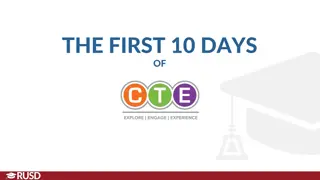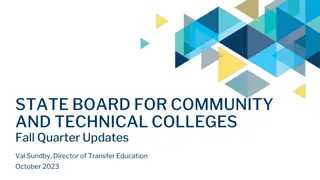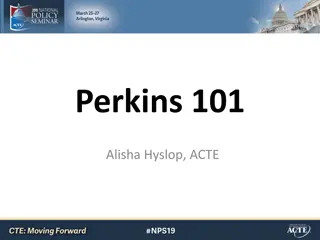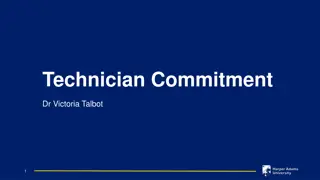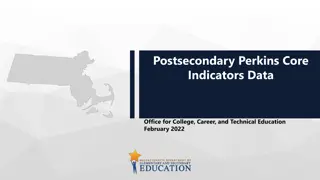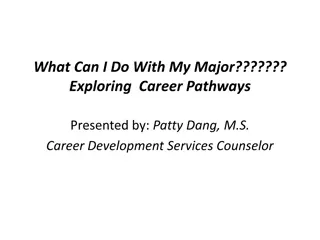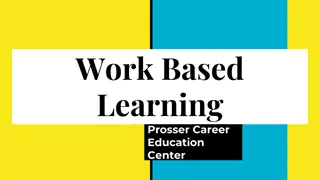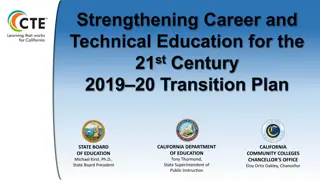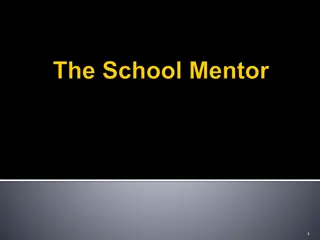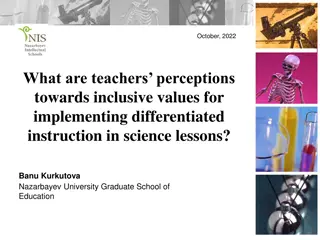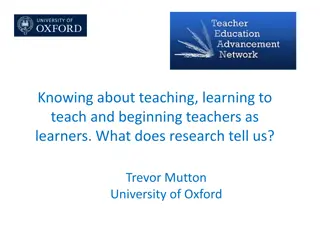Challenges and Solutions for Beginning Career and Technical Education Teachers
Navigating the realities of entering the educational field as a beginning Career and Technical Education (CTE) teacher can be daunting. This content explores the various challenges faced by new CTE teachers, including loneliness, loss of idealism, added responsibilities, and struggles to connect with the community. The importance of professional development, support systems, and understanding the mission of CTE are highlighted as key solutions to enhance teacher success.
Download Presentation

Please find below an Image/Link to download the presentation.
The content on the website is provided AS IS for your information and personal use only. It may not be sold, licensed, or shared on other websites without obtaining consent from the author. Download presentation by click this link. If you encounter any issues during the download, it is possible that the publisher has removed the file from their server.
E N D
Presentation Transcript
Debbie.Anderson@sreb.org NRCCTE
All Beginning Teachers Beginning CTE Teachers Beginning CTE Teachers Entering Through Alternative Route
All Beginning Teachers Beginning CTE Teachers Beginning CTE Teachers Entering Through Alternative Route Reality shock Loneliness Loss of idealism Struggle to survive
All Beginning Teachers Beginning CTE Teachers Beginning CTE Teachers Entering Through Alternative Route Reality shock Added responsibilities of lab and classroom space Loneliness Loss of idealism Expectations to connect with business and the community Struggle to survive CTSOs Possibly teaching in larger blocks of time
All Beginning Teachers Beginning CTE Teachers Beginning CTE Teachers Entering Through Alternative Route Demographics Reality shock Added responsibilities of lab and classroom space Loneliness Limited preparation in education theory, practices and foundations Loss of idealism Expectations to connect with business and the community Struggle to survive Mission of CTE CTSOs Curriculum foundations Possibly teaching in larger blocks of time
Teacher tasks Teacher licensing and professional development Institutional issues Briggs, J. Perceptions of career and technical education teachers about teacher mentoring and teacher retention. Ph.D. dissertation, The Ohio State University.
A research-based professional development model designed to increase early career CTE teachers competence, self-efficacy and career commitment.
Professional Development Increased Teacher Success School Support
High-Quality Professional Development Delivered Over Time Content responsive to the needs of CTE teachers Sequence and duration of the professional development sessions Quality of instruction Increased Teacher Success Regular, structured interaction with trained on-site mentor and administrator On-site observations and feedback from professional development instructor Regular interaction with a community of practice High-Quality School- Based Support Instructional competence Confidence to impact student learning Career commitment to teaching
Professional Development Support On-site coaching visits from the professional development instructor Mentoring from a trained, experienced teacher Support from the building administrator Electronic communities of practice Summer Institute 5-10 days prior to first year of teaching During First Year 3 or more 2-day events Summer Institute 5-10 days following the first year of teaching
Lesson Content Authentic Tasks Teach-back/Homework Continuously Modeling for Teachers Productive Struggle
Instructional Strategies Use instructional strategies that actively engage students in learning and encourage the development of problem-solving, critical thinking, and teamwork skills. Instructional Planning Create short-term and long-term standards-based instructional plans based on the varying learning needs of students. Teacher Competence Classroom Assessment Use formal and informal assessment strategies to evaluate student progress toward learning goals and provide feedback to improve student learning. Classroom Management Create a learning environment that encourages student motivation, positive behavior, and collaborative social interaction. Teacher Reflection: Reflect, both individually and collaboratively, on the effects of instruction and use the reflective process to continually improve instructional practice.
Introduction to Teaching in CTE The Instructional Planning Process Knowledge of Content Knowledge of Students Reflective Practice Introductions, Program Overview and Opening Activities The Big Picture of Instructional Planning A Framework for What to Teach in CTE Developmental Characteristics of Students The Process of Reflection Strategies for Meeting Diverse Instructional Needs of Students The Mission of Career/Technical Education Industry-Specific Knowledge and Skills Professional Portfolios Course Syllabus The Role of Career/Technical Education in Public Schools Academic Knowledge and Skills Students with Special Learning Needs Reflective Collaboration with Other Teachers Curriculum Mapping Professional Responsibilities Unit Plans 21st Century Skills Lesson Plans Programs of Study
Creating a Vision for CTE Instruction Using Project- Based Learning (PBL) Using Integrating Academics in CTE Cooperative Learning Developing a Rationale for PBL and Qualities of a Good Project Defining Cooperative Learning and Its Importance Embedding Literacy in Everyday CTE Lessons Understanding Actively Engaging Instruction Choosing Effective Cooperative Learning Strategies Designing Intellectually Challenging CTE Work Developing Students Reading Skills Designing High- Quality Projects Managing Cooperative Learning Activities Embedding Numeracy in Everyday CTE Lessons Asking Questions to Foster Learning Managing PBL Working with Other Teachers to Integrate Academics and CTE Presenting Information Effectively Incorporating Work-based Learning Experiences
Understanding Assessment and Its Importance to High- Quality CTE Instruction Implementing Effective Grading Practices Designing and Using Assessment Tools Using Assessment Data Analyzing Types of Assessment Data Used by Schools, Employers and Postsecondary Institutions Defining the Role of the Teacher in Assessing Student Progress Establishing the Purpose of Grading in the CTE Classroom Using Rubrics to Assess Performance Using Formative and Summative Assessment Using Data to Improve Instruction and Learning Developing Paper- and-Pencil Tests Using Standards- Based Grading Understanding the Characteristics of High-Quality Assessment Embedding Reading and Writing in CTE Assessment Organizing and Maintaining a Grade Book Providing Effective Feedback Through Formative Assessment Embedding Mathematics in CTE Assessment Using Portfolios to Measure Student Progress Over Time
Creating a Motivating, Personalized Learning Environment Setting the Stage for Effective Classroom Management Implementing Classroom Interventions Supporting Student Success Establishing the Importance of Effective Classroom Management Dealing with Inappropriate Behavior and Academic Learning Difficulties Beginning the School Year Working with Parents Designing Organized and Motivating Classroom and Lab Space Integrating Career/Technical Student Organizations Designing Interventions and Consequences Getting to Know Students Well Implementing Interventions that Support Academic Success Managing and Monitoring Lab Space Motivating Students to Do Well Being a Teacher Mentor for Students Enforcing Schoolwide Rules and Discipline Policies Organizing an Advisory Committee Establishing Classroom Rules Implementing Classroom Procedures Ending the School Year
Day Lessons Authentic Tasks Teach- Back/Homework Present introduction to students for the first day of school 1 1. Introduction, Program Overview and Opening Activities 2. Developmental Characteristics of Students 3. Establishing the Importance of Classroom Management 4. Beginning the School Year 5. Getting to Know Students Well 6. Teach-backs 1. The Mission of CTE 2. A Framework for What to Teach in CTE 3. Industry-Specific Knowledge and Skills 4. Academic Knowledge and Skills 5. 21st Century Skills 6. The Big Picture of Instructional Planning 7. Course Syllabus 8. Teach-backs Personal introduction for the first day of school Two-week unit plan for the start of the school year First day of school lesson plan Homework: The Keys to Student Motivation and research CTSOs 3 Mission Statement for a CTE Course Basic Course Syllabus Present the content of your course using a basic course syllabus Homework: Review examples of project- based learning
Syracuse City Schools Syracuse, NY* Anderson 5 Career Center Anderson, SC Meridian Tech Stillwater, OK Nashville Metro Schools Nashville, TN* West Virginia* Washington State Missouri* Kentucky* Prince Georges County Baltimore, MD Shelby County Schools Memphis, TN *teachers receiving credit toward licensure





